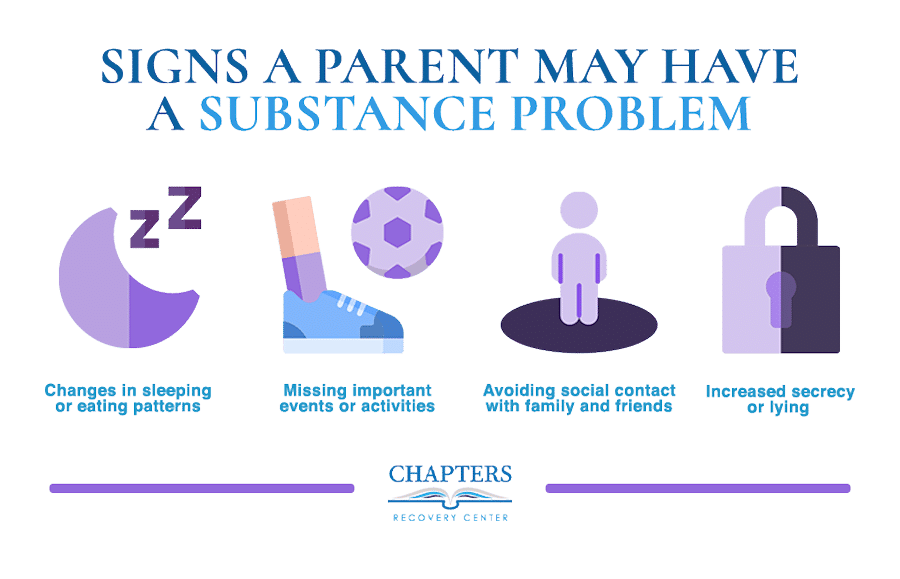For those who have loved ones struggling with addiction, life isn’t necessarily a walk in the park. Being there for a person who is abusing and addicted to substances involves a lot of complex decision-making. Not only that but there is certain emotional damage that is likely to occur when dealing with a parent’s addiction.
Thankfully, at Chapters Recovery Center in Danvers, Massachusetts, there are resources to help the child of an addict.
What is Addiction?
Substance use disorder (SUD) is a condition in which an individual has difficulty controlling their use of substances such as alcohol, drugs, or other substances. People who struggle with SUD may engage in compulsive behaviors that interfere with their daily lives and cause physical, psychological, and social issues.
These behaviors may include frequent substance abuse even when it is dangerous, spending large amounts of money on the substance, and neglecting important responsibilities. People with SUD often experience cravings for their drug of choice despite knowing the consequences.
SUD can have a wide range of effects on an individual’s life, such as problems at work or school, financial issues, relationship issues, and health problems. SUD can also lead to mental health issues such as depression, anxiety disorders, and even suicidal thoughts. If left untreated, SUD can have serious consequences for an individual’s life, leading to jail time or even death from a drug overdose.


HOW DOES ADDICTION AFFECT PARENTS?
Addiction can have a severe and lasting impact on parents. When a parent has an addiction, the entire family is affected by the disease and its consequences. Parents may neglect their responsibilities to their children or be unable to provide for them due to financial struggles caused by the addiction.
Parents may also struggle with guilt, shame, anger, and fear in response to their child’s addiction. The stress of dealing with an addicted child can cause a breakdown in family relationships, leading to arguments and resentments that can further worsen the situation.
Parents may also become codependent on their addict son or daughter, enabling them by not setting boundaries and trying to take care of their needs to avoid the pain of dealing with their addiction. This type of enabling can make it easier for the addict to continue using, as they become less likely to take responsibility for their actions and seek help.
As previously mentioned, the social consequences of addiction can also be severe, resulting in isolation from friends and family and an inability to maintain healthy relationships. In addition, addiction can lead to financial problems due to excessive spending on substances or activities related to their use, as well as legal issues such as DUIs and drug-related arrests.
HOW DOES ADDICTION AFFECT THE CHILD OF AN ADDICT?
Addiction affects a child of an addict in many ways. The first is that the child may feel responsible for their parent’s addiction; this often results in feelings of guilt and shame. Furthermore, due to their parents’ neglectful behavior, a child of an addict may develop trust issues and difficulty connecting emotionally with others.
Additionally, since addiction can lead to financial instability and chaotic living environments, a child of an addict may feel unsafe and experience disruptions in education, socialization, and even nutrition. Ultimately, the presence of addiction can severely disrupt a child’s physical, mental, and emotional well-being.
How Does the Stress of Parenthood Contribute to Addiction?
Parenthood can be an incredibly stressful experience. From the moment a child is born, parents are faced with a myriad of responsibilities and worries that produce tremendous stress. This stress can come in the form of financial strain, lack of sleep, physical exhaustion, and worrying about their children’s wellbeing. Unfortunately, this stress can lead to addiction for some parents to cope.
Addiction can start when a parent begins using substances as a way to relieve the stress that comes with parenthood. This could be drugs, alcohol, or even gambling and shopping. For example, some parents struggling with financial strain may turn to gambling as a way of hopefully earning money quickly, while others may turn to drugs or alcohol as a way of forgetting their problems. This reliance on substances can quickly spiral into an addiction if it’s not addressed.
Signs that a Parent is Struggling with Addiction
There are a variety of warning signs that can indicate a parent is struggling with addiction. Some common signs include:
- Increased secrecy or lying about where they’ve been and what they’re doing
- Avoiding social contact with family and friends
- Neglecting responsibilities such as work, caring for children, and paying bills
- Financial problems due to spending money on drugs or alcohol
- Changes in mood such as sudden outbursts of anger or depression
- A decrease in personal hygiene and healthcare
- Missing important events or activities with family or friends
- Neglecting hobbies, interests, or other activities they once enjoyed
- Changes in sleeping or eating patterns
- Preoccupation with obtaining and using drugs or alcohol
- Neglecting to take medications as prescribed
If you are concerned that a parent may be struggling with addiction, it is important to intervene early to reduce the risk of further harm. There are a variety of resources available to help parents in need, such as counseling, support groups, and rehabilitation programs. It is important to get professional help for someone struggling with addiction and support them through the process of recovery. Additionally, it is important to keep the lines of communication open and offer reassurance that they will be supported throughout the journey.
How to Help a Parent with Addiction
Helping a parent with addiction can be an overwhelming and difficult task. However, there are some steps you can take to help your parents on their path to recovery. First and foremost, it is important to provide emotional support for your parents. This may involve listening without judgment as they express their feelings and encourage them.
Let your parents know that their addiction is not a reflection of their character, but rather a sign of an illness that can be treated with the right help and support. At the same time, it is important to set boundaries with your parents to protect yourself from potential harm caused by their addiction. This may mean limiting contact until they can establish healthier habits, or it may require you to limit the type of communication you have with them.
Finally, it is important to seek out resources that can help your parents on their path to recovery. Look for local support groups, counselors, therapists who specialize in addiction treatment, and other resources that can assist in the recovery process. By taking these steps, you can help your parents manage their addiction and begin to move forward with healthier habits and happier life. With understanding, patience, and support, your parents can take control of their addiction and live a more fulfilling life.

How Children Should Take Care of Themselves with an Addicted Parent
Children who have an addicted parent face a lot of difficulties in taking care of themselves. It can be difficult for them to understand the changes that addiction brings and how it affects their family. They may also struggle with feeling anxious or overwhelmed when trying to cope with these changes.
One way children can take care of themselves is by finding a safe space where they can express their feelings. It could be with a close friend or family member or through activities such as writing in a journal, drawing, or playing an instrument. This space should provide them with the opportunity to express their emotions without being judged.
Another way children can take care of themselves is by taking breaks from the situation. This could involve engaging in activities that bring them joy, such as reading a book, going for a walk, or playing with their pet. Taking breaks can help a child to manage difficult emotions and feel better about themselves.
How Chapters Recovery Center Can Help a Parent with Drug Addiction
Chapters Recovery offers the utmost in comprehensive drug and alcohol addiction treatment. There’s no cookie-cutter treatment method that will solve all a person’s problems. Each person is a unique individual and deserves treatment that reflects their individuality. Some treatment methods for addicted parents include the following:

WHAT METHOD OF CARE IS BEST FOR A PARENT STRUGGLING WITH ADDICTION?
The best method of care for someone struggling with addiction is an individualized approach that focuses on the person’s unique needs. It is also important to provide supportive services to help individuals develop coping skills and life skills, as well as resources to help them stay in recovery.
A comprehensive approach to care that provides education, support, and access to resources is essential for successful long-term recovery from addiction. Additionally, it is important to address any underlying mental health issues such as depression or anxiety that may be contributing to the addiction so that these issues can be adequately treated.
Finally, it is important to have strong support from family and friends to create an environment of understanding and encouragement for the individual in recovery. With a comprehensive treatment program and supportive community, individuals can successfully overcome addiction and lead healthy, productive lives.
Get Your Parent the Help They Need
It’s difficult to struggle with addiction, but it is even more difficult when someone you love is suffering. This is the same when it comes to addicted parents. If you or a loved one would like to find out more, you can contact us here.

